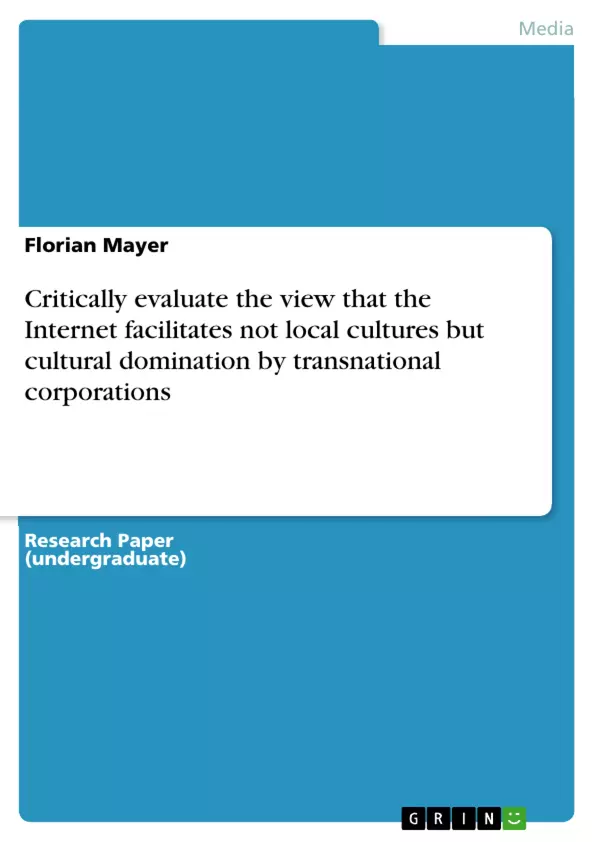The early internet, whose invention some authors compare to the revolution the exploitation of the power of steam brought about, was developed in the US in an university and military context and mainly financed by ARPA, the US Department of Defence Research Agency. In the 1970s in the US thought was given to the need to back up computing systems in case of nuclear attack which resulted in yoking the machines together, which then formed part of what we today call the internet. Its development from there has been viewed as being in the hands of its users. The fundamental principles of the internet were ‘free circulation of information, belief in the productiveness of confrontation and interaction, autonomy, and individual responsibility’. What is more, because the academic and countercultural computing cultures were made up of intellectuals, these cultures were able to produce accounts of themselves with some advocates highlighting the capacity of the internet to (re)establish community and foster local cultures.
In the following pages we will be looking at how the internet has altered existing social relations of production and consumption. It is being examined in how far the internet offers the opportunity ‘to challenge the authority of the producer, democratise production capability, and empower consumers’ and in how far it remains a public space free of interference, both from government control and commercialism.
Inhaltsverzeichnis (Table of Contents)
- Introduction
- The internet and local cultures
- Transnational corporations and the internet
- Conclusion
Zielsetzung und Themenschwerpunkte (Objectives and Key Themes)
This paper aims to critically evaluate the assertion that the internet facilitates cultural domination by transnational corporations, rather than fostering local cultures. It explores the potential of the internet to empower local communities and individuals, while acknowledging the growing influence of commercial interests.
- The internet's potential for democratizing cultural production and information sharing
- The role of transnational corporations in shaping online content and experiences
- The impact of the internet on the development of local and indigenous cultures
- The challenges of access and the digital divide
- The interplay between global and local forces in shaping internet culture
Zusammenfassung der Kapitel (Chapter Summaries)
The introduction examines the early development of the internet, emphasizing its origins in academic and military contexts. It highlights the potential of the internet to foster communication and community building, while acknowledging the inherent risks of commercialization and government control. This section also touches upon the issue of access and the digital divide, emphasizing the need for a more inclusive and equitable internet experience.
The section on the internet and local cultures explores the potential of the internet to empower local communities and individuals. It examines the ways in which the internet can facilitate cultural production, information exchange, and political activism. Examples of the internet's use by marginalized groups, such as the Kurds and Aboriginal peoples, are discussed. The section also acknowledges the risk that commercial interests might come to dominate online spaces, potentially hindering the development of local cultures.
Schlüsselwörter (Keywords)
The key themes and concepts explored in this paper include the internet's impact on local cultures, the role of transnational corporations in shaping online content, the challenges of access and the digital divide, the potential for cultural production and information exchange, and the interplay between global and local forces in shaping internet culture.
Frequently Asked Questions
Does the internet promote local cultures or corporate dominance?
The paper critically evaluates both sides, acknowledging the internet's power to empower local communities while noting the increasing influence of transnational corporations.
What were the origins of the internet?
The internet originated in the US within academic and military contexts, primarily financed by ARPA (Department of Defence Research Agency).
How can marginalized groups use the internet?
Marginalized groups like the Kurds and Aboriginal peoples use the internet for cultural production, information exchange, and political activism.
What is the "digital divide"?
The digital divide refers to the gap between those who have easy access to the internet and digital technology and those who do not, often affecting marginalized or local cultures.
How do transnational corporations influence the internet?
Corporations shape online experiences and content through commercial interests, which can sometimes overshadow or dominate local cultural expressions.
- Quote paper
- Florian Mayer (Author), 2003, Critically evaluate the view that the Internet facilitates not local cultures but cultural domination by transnational corporations, Munich, GRIN Verlag, https://www.grin.com/document/13394



